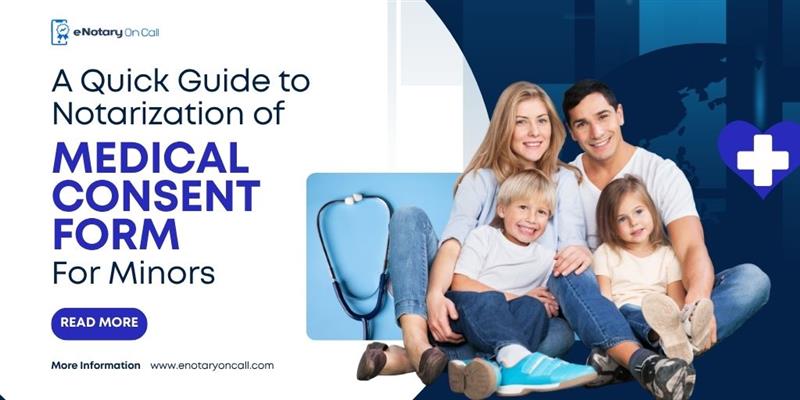A medical condition that can render a person unable to make the right decisions for their well-being can happen at any time in anyone’s life. The situation where a person becomes unconscious or mentally incapacitated demands quick treatment to prevent the problem from worsening.
Therefore, during such times, it is required to have somebody make a medical decision on the patient’s behalf. However, they should also have the legal right in such stressful situations. Thus, the medical power of attorney was introduced long ago to prevent further health decline.
This also restricts any wrong person from making decisions for the patient (who is not in a condition to take any action).
This blog will introduce you to the process of notarizing medical power of attorney and its importance, now more than ever in 2025.
What is Medical Power of Attorney?
It is a document that gives power to a person when someone is not in a condition to make the medical decision for themselves. This way, the respective healthcare-related choices can be taken even when a patient cannot communicate.
To make the concept of medical power of attorney more straightforward for readers, this POA is legally considered across jurisdictions for practical application.
Who Benefits from Medical Power of Attorney?
Many assume an MPOA only helps during medical emergencies. In reality, it proves valuable in several unexpected situations. Here are examples of who can benefit and how:
#1. Professionals
This umbrella term constitutes freelancers, working professionals, or business owners. The MPOA benefits them by enabling them to grant rights to any trusted person for medical processes legally. This helps them to run their business even when they are incapacitated.
#2. Individuals Living Away from Home
A medical emergency can come at any time, anywhere. A person staying abroad and undergoing surgery may require proxy assistance to prevent delays. This ensures their wishes for their health or treatment procedure are respected and also avoids any legal complications.
#3. Patients Suffering from Chronic Illness
During someone’s chronic illness, the next of kin sometimes struggles a lot to make medical decisions. The MPOA saves them from the burden of making tough decisions while clarifying their roles and avoiding disputes.
#4. Travelers
When a person is moving frequently from one place to another, the MPOA helps the assigned person or agents make medical decisions and coordinate care.
#5. Sudden Health Crisis
A patient’s sudden health issue requires quick action. The medical power of attorney takes away the stress of making the right decision by ensuring the patient’s preferences are followed for their better health.
#6. Caregivers and Planners
In some MPOAs, modern clauses (such as HIPAA or geographical portability) are included, ensuring the proxy remains effective even as healthcare norms evolve.
Reasons Professionals Should Secure a Healthcare Proxy
This real-world example provides a compelling reason to consider the MPOA.
A woman, Teri Schiavo, who did not have an MPOA, remained in a vegetative state for 15 years. Her husband and family were in an emotional dilemma and dispute as they couldn’t agree on her medical wishes, even during such tough medical suffering.
This is one of many examples, and even now, there are around 36.7% of US adults who have an advance directive or 29.3% with a living will. These numbers clearly show that those who are not ready with a power of attorney or care proxy are likely to suffer when they are not able to make decisions for their health.
What are the Strategic Benefits of MPOA?
Apart from the medical benefits to an individual, there are some strategic benefits, which are as follows:
- It helps in avoiding legal battles regarding guardianship.
- It avoids delays in administrative tasks and reduces disruptions in terms of financial matters.
- It maintains continuity for both business and medical issues.
Also Read – Revoking a Power of Attorney: Legal Steps You Must Follow!
Is There Any Legal Importance of Medical Power of Attorney?
Yes, some legal factors come into play while making medical decisions if a person fails to take action for themselves. To avoid complications related to those, it is good to know the importance of MPOA. Below are a few of them:
- Provides Legal Authority – The agent a person chooses gets complete rights in terms of medical decisions when the person becomes incapacitated. No one can then question their decision.
- Avoids Court Guardianship – There will be no need for costly and time-consuming proceedings. Having a pre-designated healthcare proxy eliminates this.
- Compliance with Healthcare Laws – Any hospital would have to follow the decision taken by the agent for a patient without creating issues. They are legally obliged.
- Avoids Family Conflicts – The document with a clear statement about the agent eliminates family disagreements during emergency medical situations.
Medical Power of Attorney: How to Fill and What to Keep in Mind?
There are a few things that need to be kept in mind while completing the document. There are a few things that need to be kept in mind while completing the document. The following should be included:
- Information about the agent
- Clear information about the power of the agent related to a specific situation
- Duration for which an agent would be involved
- Information about the secondary agent if the primary one is unavailable due to any circumstances
- HIPAA and privacy authorization
- Clear signature and date according to state rules
A Medical Power of Attorney (MPOA) empowers a trusted person to make critical healthcare decisions when an individual cannot. To make this document legally binding and widely accepted, notarization is a vital step. Without it, families may face disputes or delays in emergencies.
With eNotary On Call, notarizing an MPOA becomes fast, secure, and convenient. The platform allows individuals to complete the process online anytime, ensuring their healthcare wishes are respected without unnecessary obstacles.


